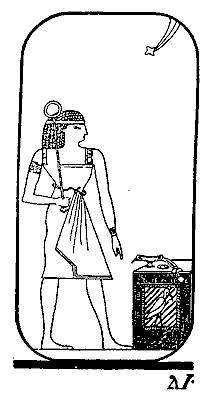
The Magus (magician) is standing in the attitude of the will-power about to act; he is dressed in white, the emblem of purity, with a circle of gold around his brow, emblem of eternal light; he holds in the right hand a scepter tipped with a circle, the emblem of creative intelligence. He raises this scepter toward Heaven to indicate his aspirations to wisdom, science and moral force. His left hand points towards the earth to show that he is ready to dominate over matter. In front of him, upon a cube -- the image of absolute solidity -- are found a cup full of human passions, a sword, the weapon of the braves who fight error, finally a golden pentacle (piece of money), the emblem of the reward granted to voluntary labor. His belt is a snake biting its tail, the symbol of eternity. The Ibis upon the cube typifies vigilance.
This Arcane, I., means: A firm will and confidence in yourself guided by reason and the love of justice shall lead you to the object of your ambition and save you from the dangers on the way.
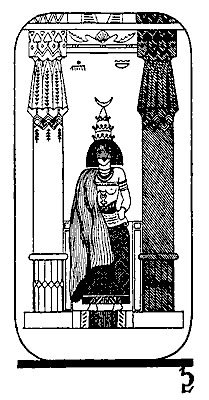
Here we have Occult Science represented by a stately woman seated between two columns of a temple, these columns representing Good and Evil; the figure is crowned with a crescent and her face is veiled, as a sign that Truth is not visible to the profane; she has upon her breast the Solar Cross, emblematic of universal generation, and, in her lap, a papyrus half covered by her cloak, indicating that the mysteries of the sacred science are unveiled only to the Initiated. The tiara upon her head is the emblem of the power of intelligence lighted up by wisdom represented by the crescent; the figure is seated, because science united to wisdom and will-power is immovable.
This Arcane, II., tells us that if man possesses a strong will he cannot fail to see the true light and to obey it properly. It is essential, however, that he should keep silent as to his opinions and projects, as it has been said that "the world belongs to the silent ones."
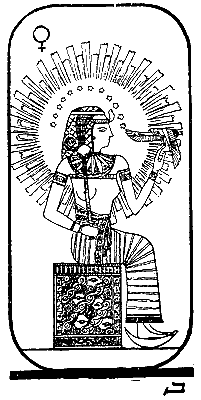
This is the ancient idea of Nature. It is represented by a woman seated upon a cube covered with eyes, the emblem of the visions of the famous seer, Hermes. Her feet rest upon a crescent of the moon, the emblem of matter subjected to mind. She is crowned with twelve stars representing the twelve months and the Sun serves her as a Nimbus, thus symbolizing the creative power of intelligence. In one hand she holds a scepter tipped with a globe, the emblem of her despotic action over the world; on her other hand is posed an eagle, its head turned towards her; this signifies the flight of the human soul returning to its initial principle: God.
This Arcane, III., means: That to wish for things possible is equivalent to creating them. To wish for things impossible is to prepare one's own ruin.
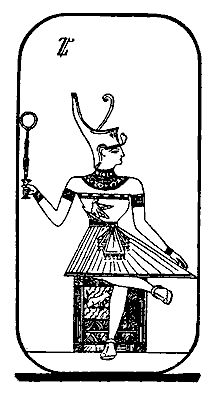
Here is a man bearing on his head a crowned helmet, the emblem of conquest, as the cube upon which he is sitting is the symbol of labor that has reached its completion. He holds the scepter of the Magi as a sign of the moral power acquired through sacred studies. His left hand, pointing downward, indicates the mastery over matter, while the dove on his breast symbolizes innocence, and his crossed legs signify the expansion of the power of human mind within the three dimensions of the Infinite: Height, Width, Depth. The cat upon the cube symbolizes the thought of the Magi who is able to see through the night of the ancient times.
This Arcane, IV., means that nothing resists a firm will-power which has for its lever the Knowledge of Truth and Justice. To fight for both is more than a right, it is a duty. Whoever triumphs in this struggle has simply accomplished his mission. Whoever fails, in spite of his honest efforts, is entitled to immortality.
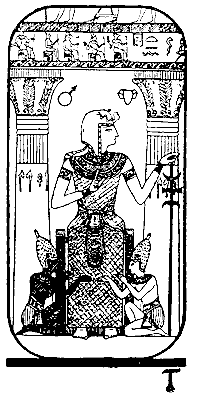
The high priest of Isis is here represented seated between the columns of the sanctuary, one hand on a long cross with three crossbars, symbolizing the penetration of the creative genius through the three worlds. (Divine, Intellectual and Physical.) The two columns mean, respectively, the Law and the Freedom of our will-power which may obey or disobey. The other hand makes the sign of meditation and silence. At the feet of the high priest, two men are kneeling: a white man, personifying Good and a black man personifying Evil, both submitted to the Master of the Arcanes.
This Arcane, V., means that before you may tell a man whether he is happy or unhappy, you must find out what use he has made of his will-power, for every man is created to the image of his own works.
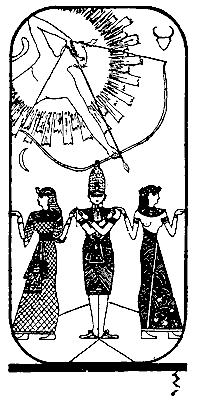
Here the Disciple or Neophyte is seent hesitating between two ways, each of which is pointed out to him by a woman symbolizing, the one to the right, Vice, and the one to the left, Virtue. Above, is seen a Genius holding a bow whose arrow is pointed toward Vice as a warning of the punishment that awaits the man who has preferred the easy road to vice to the hard road to virtue.
This Arcane, VI., means that one must watch over one's self, and above all show no indecision in the crucial moments of existence. Nor must one be discouraged because obstacles seem to bar the road to happiness. A strong will-power will suffice to overcome them all.
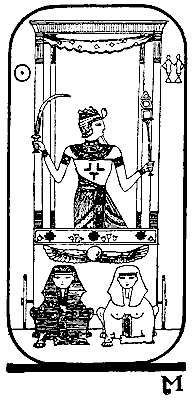
Here we have a warrior riding a cubic chariot, upon which four columns support a starry dais; these columns symbolize the four elements, while the cubic chariot signifies that the ambition of the warrior has been realized through his will conquering every obstacle. The warrior himself has a golden band around his brow as a sign of the eternal light he is endowed with. In one hand, he holds a sword, the emblem of victory, and in his other hand, a scepter tipped with a square (Matter), a circle (Eternity), and a triangle (Divinity). He wears oh his breast a Cuirass, the emblem of strength: it is adorned with three T-squares, which represent Good Judgment, Will-Power and Action. A winged sphere, on the front of the chariot, speaks of the exultation of the intellectual power in the infinite space and time. Two Sphinxes are hitched to this chariot and are now at rest. The black one represents Evil, the white one Good. They are both the slaves of the Magus when he has come out victorious from the various tests.
This Arcane, VII., means that the empire of the world
belongs to those who possess the sovereignty of the mind; that is to say
the Light which reveals all the mysteries of life.
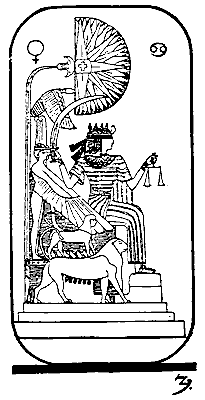
At the top of three steps which represent the three worlds, sits a woman, her brow encircled with a crown of iron, the emblem of inflexibility; her eyes are bandaged, to indicate that she holds no account of the social positions of the accused ones. A sword in one hand and a balance in the other, she judges and she punishes. The lion by her side symbolizes Force ruled over by Justice, and the Sphinx next to it, the eye of God who looks into the souls of the wicked. The winged Turtle above symbolizes Repentance which may obtain forgiveness in spite of the greatness of the crime. Finally, a divine messenger tells us that the justice of God will be the final judge of the justice of men.
This Arcane, VIII., means that everything in life is a pretty even struggle between Good and Bad, and that every action brings in its wake a re-action, thus forcing us to be most cautious in our thoughts and undertakings.
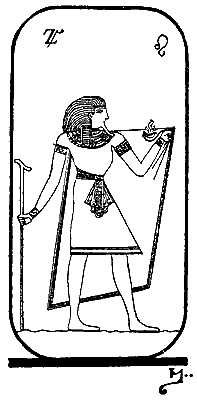
An old man, the symbol of wisdom, holds a lighted lamp which he covers with his mantle as a sign of discretion. He walks on, leaning on a stick, the symbol of strength acquired through experience.
This Arcane, IX., means that Wisdom has to be appealed to in every circumstance of life. It teaches one also to be discreet and silent in all critical circumstances.
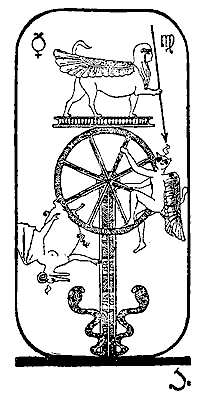
We have here the most ancient drawing of the Wheel of Destiny turning upon its axis. On one side we see the God Kne-phta, the Spirit of Good; on the other side, Typhon, the Spirit of Evil, who is about to be thrown off from the wheel while the Spirit of Good is rising. Over the whole presides a full figure of a winged Sphinx representing the four forces of human nature: to Know, to Dare, to Act, to Be Silent. The Sphinx remains in perfect equilibrium as if the constantly revolving wheel of fortune had no influence over him. He thus symbolizes the mysterious power of God disposing of human destinies according to the good or bad actions of everyone. In his claws, the Sphinx holds a javelin, the emblem of supreme justice. At the foot of the supporting beam of the axis, two snakes symbolize the even forces that balance each other, while both constantly struggle for supremacy.
This Arcane, X., means that if we want only what is true, what is just, what is within our reach: if we keep silent as to our designs: if, finally, we add perseverance to the rest, we shall find ourselves one day in possession of the Key to Power.
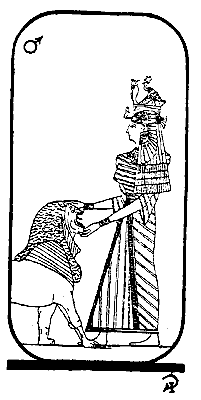
We see here a young maiden opening and closing without effort the mouth of a lion, an emblem of the power over one's self acquired through the education of the willpower and the experience of life.
This Arcane, XL, means that if we are endowed with sufficient faith we may go ahead fearlessly. Obstacles are more imaginary than real. Let us find where our duty lies and accomplish it without hesitation.
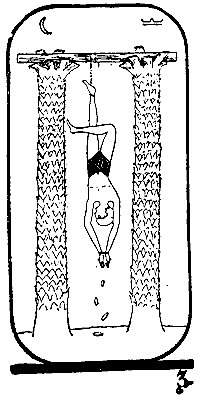
A man is hanging by one foot from a gallows stretched across the trunks of two trees the twelve branches of which have been cut off. His hands are bound and from them drop pentacles or gold pieces. One of his legs, folded down and forming with the other a reversed triangle, tells us that he dies the victim of the wicked ones. His bound hands from which drop the gold pieces, mean that ideas survive those who sacrificed themselves for them and that they will come forth later. The twelve branches that have been cut down symbolize the signs of the Zodiac who return regularly year after year.
This Arcane, XII., means that one must sacrifice one's self for others without awaiting anything but ingratitude as a reward. Forgiveness must remain our most precious gift, as it causes us to resemble more closely our Divine prototype.
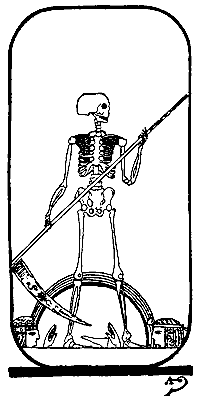
A skeleton armed with a scythe symbolizes Death mowing down human beings whose heads, feet and hands are constantly born again, so to speak, while a rainbow rises in the horizon, an emblem of the immortality of the soul.
This Arcane, XIII., means that we must raise our minds above earthly things, otherwise the bitterness of our disappointment will shorten our days. However, if Death should come to us early, we need not sorrow for it, since a new life and a better one is promised us, according to our merits.
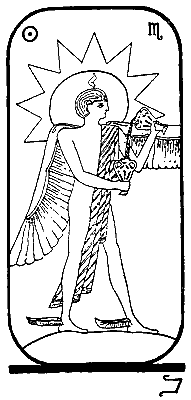
A figure representing the Sun is transferring from a golden vase into a sliver vase the elemental forces of nature, a symbol of the great magic agent -- the Electric and Magnetic Fluids combined -- the image of the perpetual fecundation of Nature by means of Light and Heat, which are also Movement and Life.
This Arcane, XIV., means that we must so husband our forces, moral and as to wear out all obstacles, little by little, as a drop of water pierces a stone.
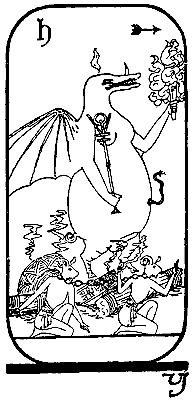
This is the Spirit of Evil, of Fatality and of Chaos. It is represented by a hippopotamus with the head of a crocodile, the feet of a goat and the characteristics of man and woman. A snake emerges from his body, to show that he begets nothing but evil; his wings, like those of a bat, show him to be the Spirit of Darkness. He is seen here rising from ruins, one of his hands waving the torch of destruction and the other holding the scepter of division and hatred. At his feet are two men with goats' heads and chains around their necks, symbolizing those beings whom vice brings down lower than the beast. The horn on the figure's nose indicates his rebellion against the Divine Spirit, which he seems to be insulting.
This Arcane, XV., means that fatality will ruin your future plans if your passions are not kept in strong control by your willpower.
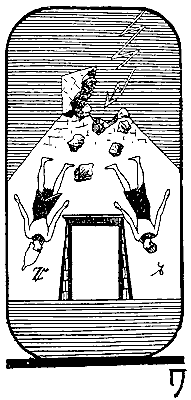
We see here a pyramid whose pinnacle is crushed down by a stroke of lightning, throwing down two men, one of them with a crown on his head. This symbolizes the ruin of human pride and false science by the sudden influx of the Astral fluid.
This Arcane, XVI., means that you are going straight to your ruin, which will be due to your exaggerated pride, your foolish ventures and your voluntary mistakes.
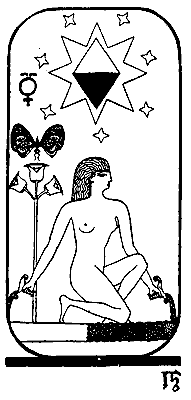
This represents a nude young girl with one foot upon the Sea and one foot upon the Earth; she represents Truth and holds two cups from which flow Kindness and Charity, the balm that alleviates human suffering. The Sea represents the bitterness of the days of sorrow. Over the young girl shines an eight-pointed star, a double symbol of the Universe and of the divine Trinity; at its center is found a white pyramid united to another pyramid, a black one and up-side-down. This is the emblem of the great occult law which is worded as follows: "That which is above is like that which is below." Seven smaller stars represent the seven Planets of Ancient Astrology. Next to the woman there is a flower with three blossoms and above the upper one a butterfly opens its wings.
This Arcane, XVII., means that if you free yourself from your lower passions and your inborn errors, and steadfastly study the mysteries of the true science you will be given the key to the mysteries of life.
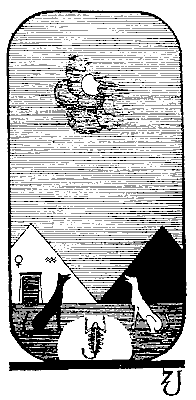
Two pyramids stand on the edge of a road; in front of them two dogs howl at the moon; below, a scorpion is seen. One of the pyramids is white and is the emblem of True Science; the other pyramid is black and is the symbol of Error. The two dogs represent Good and Evil, and the scorpion is the emblem of Perversity, the worst feature of vice.
This Arcane, XVIII., means that everything is conspiring against you and you alone are kept in ignorance of the real situation. Enemies of the worst kind are plotting against you, often hiding their treachery under the garb of flattery
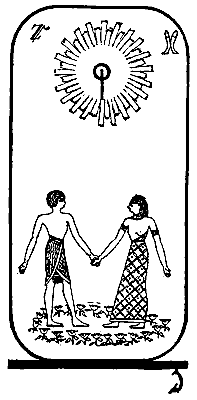
Under a radiant sun, a young man and a young girl hold each other by the hand within a circle of flowers; this Arcane symbolizes love, which brings with it Happiness; the sign within the sun above the couple is the symbol of universal generation.
This Arcane, XIX., means that you will be happy and no one shall take your happiness from you, if only you keep it within the limits of the home and the sanctuary of your heart.
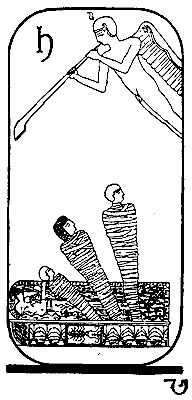
A Genius is blowing a trumpet above a Sarcophagus out of which emerge a family of father, mother and child. This not only symbolizes the Last Judgment of the Dead, but also the awakening of souls that have been put to sleep by error or inaction.
This Arcane, XX., means that you must not allow yourself to sink into sloth or forgetfulness, since you have a mission to fulfill and Providence is ready to reveal it to you as soon as you show yourself willing to accept the message.
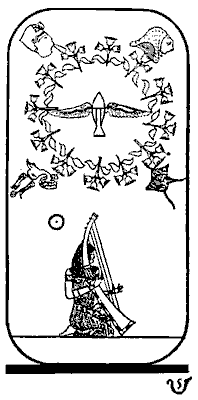
We have before us a wreath made out of lotus flowers. At each of the four angles is found a head, respectively that of a lion, of a man, of an eagle and of a bull; they symbolize the four winds of the spirit, and in the center is found the primitive "lingham," the supreme Arcane of the universal generation of the three worlds, the absolute in the infinite, and the conjunction of the sexes. The wreath itself is the emblem of the magic chain that unites all beings, all things and all ideas. Under the wreath is a kneeling young girl representing Religion and playing upon a harp of three strings, the image of the triple harmony within man: Soul, Mind, Body.
This Arcane, XXI., means that you may reach the greatest height to which man may aspire; it promises you that your most ambitious desires will be realized and that your final success will only be limited by your wishes.
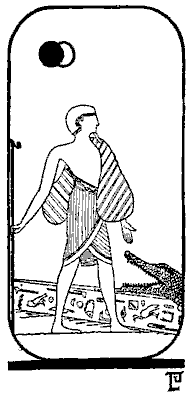
This image, which has often been called the Atheist, or the Fool, represents a blind man with a bag on either side of his shoulder and a stick in his hand, walking towards a broken obelisk, stretched on the ground and behind which, with its huge mouth open, a crocodile awaits him. It is truly the picture of the Atheist who sees not the divine light and carries the weight of his mistakes and his faults. His stick cannot guide him, and he walks, urged on by fatality towards his ruin, symbolized by the voracious crocodile. In the sky above, the sun is partially eclipsed by a dark shadow, the symbol of Doubt destroying Faith.
This Arcane, XXII., means that a number of misfortunes are threatening you, and that your only hope is to come to you from Heaven towards which your prayers must rise constantly.